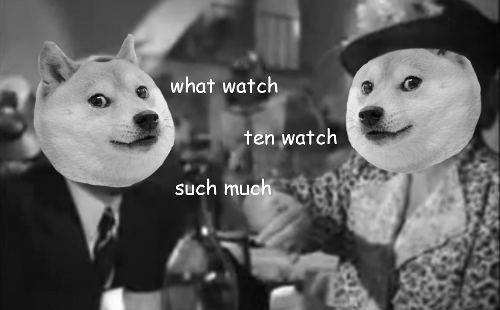---
Such odd. Much cute. So passing fad. The internet phenomenon of doge has been fashionable for some months now and has attracted the interest of linguists. It originally tagged pictures of the Japanese dog breed shiba inu (in multicoloured Comic Sans font), so the name is a deliberate misspelling of dog (no link with the one-time ruler of Venice; don’t ask how it’s said as wars have been started over less and the consensus seems to be “any way you want”). Doge pairs a modifier and a noun to create a dissonant phrase. The main doge modifiers are much, many, so, very, such, plus three words that can be used by themselves: wow, amaze and excite. Typical phrases are very eat, much grumpy, so trick, which usually have meaning only when written on a photo. But I found a retelling of Shakespeare’s Romeo and Juliet in doge, which begins:
What light. So breaks. Such east. Very sun. Wow, Juliet.
What Romeo. Such why. Very rose. Still rose.
Very balcony. Such climb.
Much love. So propose. Wow, marriage.
What interests linguists is that it’s much more than just bad English. It has a strict grammar that deliberately subverts the standard one. You have to have a sophisticated intuitive understanding of English to write good doge. A newbie user wrote “Much respect. So noble” and was immediately corrected because it was too conventional — it should be “Much noble. So respect.” An article in the Daily Telegraph in February was headlined, “Doge: such grammar. Very rules. Most linguistics. Wow”, which pretty much sums it up."
---
I think that last line should be "so grammar. very rules. most linguistics. wow" - lack of capitalization included - but hey, it was the Daily Telegraph and I bet the editor wouldn't let them do that.
Doge fascinates me because it was so obvious that there were rules and grammar to it, which were unofficially, somehow, agreed upon (and argued about as though they were actual grammar) by people who learned the meme and learned to use it. Doge utterly baffles and confuses anyone who isn't in on the joke, but it doesn't take long to get in on the joke - just see a few doge pictures. Then reconstruct the general rules of the meme. To write good doge, the modifier has to disagree with the noun to the greatest extent possible. It has to be the opposite of the right word. Which is why I'd argue that "so grammar" is better than "such grammar." I can imagine using the words "such grammar" together in actual English. Hence, =/= doge. Though, I could be wrong: and of course, the rules of doge don't actually exist except as some sort of collective understanding between total strangers on the internet.
Lots of memes work like this - the Batman/Robin slap meme, the Boromir "one does not simply" meme. You know, after a few examples, where the text breaks, what sort of font to use (the meme generation sites that have sprung up do dictate some of those fonts: but one seems to emerge as the winner, making others look clumsy and amateurish, as though the user doesn't really know the language of the meme). And some are better written than others. Some are plain dumb. Some are created as in jokes for groups so small that the joke is lost on everyone else. But the successful ones can be really clever, and often pick up some universal frustration that a large number of people are feeling.
Doge, though, is a different breed (no, not shiba inu). Doge - a lot like its grandparent, lolspeak - is a language game. Part of the in joke with doge is "I know how to do this." Beyond "I know how to do this" is "I know how to do this and be clever with it."
On a picture I posted on Facebook of me rock climbing into the sun, stopping to shade my eyes, I commented simply, "very sun. so squint. wow." That's just demonstrating that I know doge and I can do it passably, and fishing for a 'like' from someone else who's in on the joke. It's when you can do something like this, where the reader/viewer can be in on two completely different in jokes, and you've done something clever with the linguistic rules of doge (say, by finding an example of something that looks a hell of a lot like doge from long before the internet existed): then you've reached doge mastery. IMHO.



